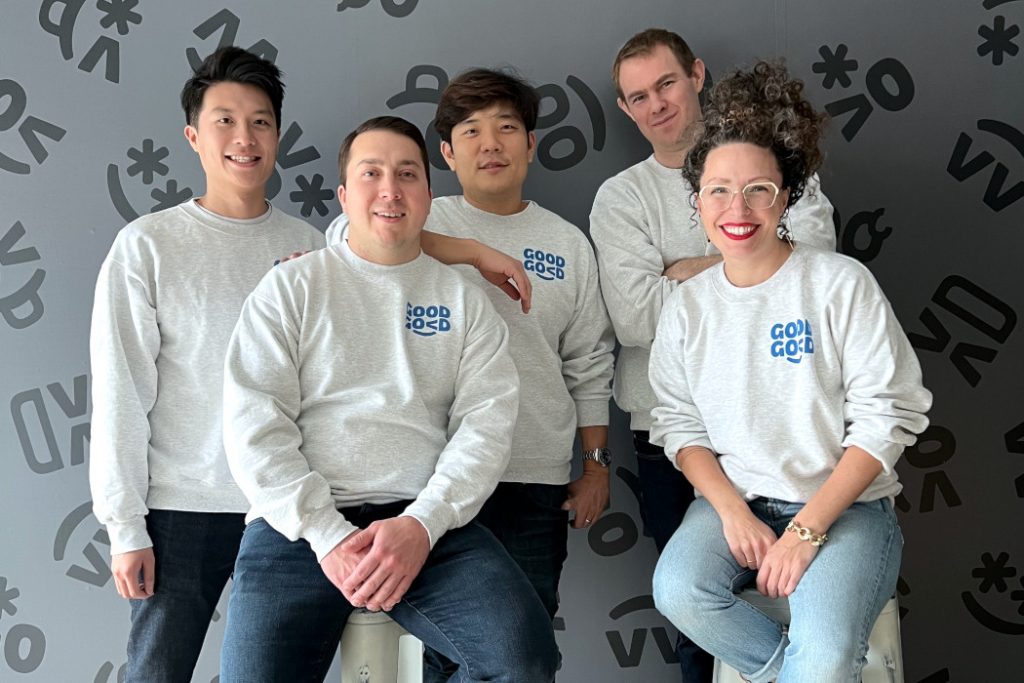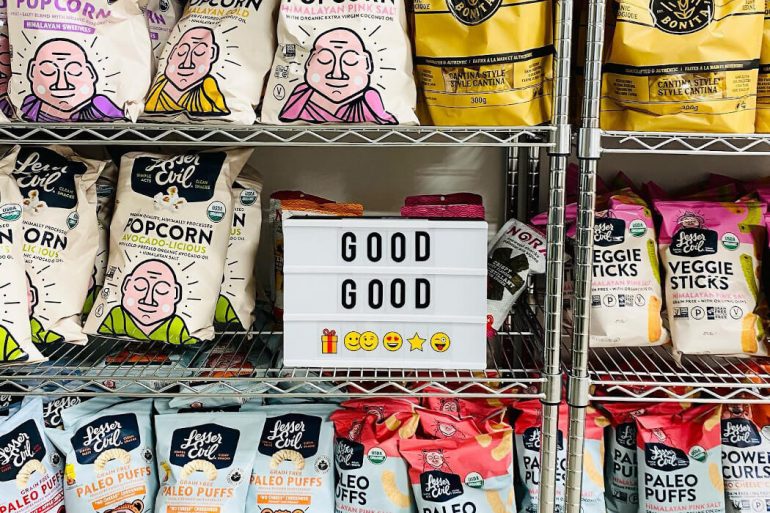Ritual’s co-founder Robert Kim and former senior director of partnerships Kris Linney have co-founded a new Toronto-based local commerce startup that aims to help small craft food and drink makers grow.
In April 2021, Kim and Linney teamed up to launch GoodGood after noticing that, despite the increased demand for local commerce during COVID-19, there was a gap in the market to access and discover craft items like beer and specialty snacks.
“After seeing the impact the pandemic has had on small businesses, I knew that there was a timely problem I could help with.”
-Robert Kim, GoodGood
Now, armed with $6.5 million CAD in initial seed financing and the support of a group of investors that includes Wyoming-based cryptocurrency-focused firm BKCM, Toronto’s Golden Ventures, and angel investors from Shopify and Digital Main Street, the pair plans to use the fresh capital to help more Torontonians discover and buy from local makers through its combination delivery platform and brick-and-mortar model.
GoodGood’s all-equity seed round was led by BKCM and supported by Golden Ventures, Maple VC, Tet Ventures, and a group of Canadian angel investors that includes Farhan Thawar, Shopify’s VP of engineering, and Chris Rickett, the co-founder of Digital Main Street.
The startup, which first launched its website a month ago, opened a pop-up café in Toronto’s King-West neighbourhood on December 6. In 2022, GoodGood plans to open five to 10 café and wine bars across Toronto, from which it intends to offer instant delivery and the chance to browse and buy goods in-person, as well as the opportunity to meet the people who made them.
“I decided to start GoodGood because I saw an immense opportunity to help local makers grow, while providing communities with access to their great products,” Kim, GoodGood’s CEO, told BetaKit in an interview. In September, Kim left fellow Toronto-based commerce startup Ritual, a social ordering app he co-founded.
Kim, who remains an active Ritual advisor and shareholder, said he has been passionate about local commerce “for the past two decades,” adding that, “after seeing the impact the pandemic has had on small businesses, I knew that there was a timely problem I could help with.”
“This is why we started GoodGood and why we had to jump on it right away,” said Kim.
The CEO highlighted that although the craft food and drink industry is large and growing quickly, many craft products remain difficult to access.
“By nature, the [craft] industry is quite fragmented, and it’s actually hard, relatively hard, to get all of these products easily,” said Kim.
Prior to co-founding GoodGood and Ritual, Kim co-founded Fat Free Mobile, an app allowing users to recreate traditional websites on mobile that was acquired by Research in Motion (RIM) in 2007, and commerce platform PushLife, which was acquired by Google in 2011, spending some time at both companies following those deals.
“This is an experienced founding team that we’ve previously backed through Ritual—you don’t walk away from a chance to work with these folks again,” Ameet Shah, partner at Golden Ventures. “The concept of local-first quick commerce has been successful globally, and we’re confident that this team is the right one to win in the Canadian market.”
RELATED: Ritual acquires contact tracing platform AllChecked.in
Kim said his time at Google and Ritual in particular helped him understand “the power of local and community,” adding that he hopes to use the experience and knowledge he gained with both companies “to help communities access products from local craft makers easier and faster.”
“Toronto has an amazing food sector, overflowing with interesting craft brands from entrepreneurs who sometimes struggle to expand their markets,” Rickett told BetaKit. “GoodGood will provide a pathway to new markets for these entrepreneurs, many of which are women and from equity-deserving communities.”
GoodGood joins a growing and competitive local commerce sector that includes digital restaurant delivery giants like UberEats and DoorDash, as well as online grocery delivery services like Gopuff, Gorillas, and Jokr that have seen a ton of venture capital investment this year.
According to Kim, what differentiates GoodGood from other platforms is that it is already local-first, as three quarters of the products currently listed on GoodGood are Canadian, and “a lion’s share” are from Ontario and the Greater Toronto Area, while the remainder are sourced from other countries.

The CEO cited GoodGood’s plan to develop a physical presence in the neighbourhoods it serves as another point of distinction.
According to Kim, one of the challenges for small makers selling on these apps is that it’s easy to get buried amongst a crowd filled with larger, more established players.
“As e-commerce has become more competitive, small producers have fewer opportunities and too often get left behind,” said Brian Kelly, the founder and CEO of BKCM. “We believe that by partnering with local makers, GoodGood can become the platform that connects you to quality local products… all at the push of a button.”
Most of the makers GoodGood aims to serve don’t have storefronts. Some sell their products to customers directly, while others are available in grocery stores, but the latter involves a lot of leg work, and isn’t something many makers who are just starting out are prepared to do.
RELATED: Digital Main Street’s Future Proof program supports 75 pilot projects in Ontario
GoodGood’s goal is to build a platform for these makers that makes it easier for them to sell their products. The company’s current strategy is to work with “as many makers as possible.” Kim said the startup plans to let the communities it serves determine which products they prefer and which they do not.
“The future of Main Street requires [that] businesses have technology at their base,” said Rickett. “GoodGood is a great example of the future of Main Street retail—it has technology at its core, using it to deliver a great in-person and online experience, while helping bring hard-to-find local craft food brands to a mass market.”
To start, GoodGood plans to focus on establishing its presence in Toronto, which Kim described as the market with “the most amount of makers.”
“As e-commerce has become more competitive, small producers have fewer opportunities and too often get left behind.”
-Brian Kelly, BKCM
With this funding round, GoodGood’s main aim is to build out its network of café and wine bars across the city. The startup also plans to put some of the proceeds towards product engineering, as it looks to fuel the construction of its mobile app, which GoodGood plans to launch in the first quarter of 2022.
From a product development perspective, Kim said GoodGood has two areas of focus: investing in its customer-facing e-commerce platform, and building its maker-focused platform.
The startup currently has 10 employees, and plans to grow its ranks to 30 to 50, including café staff, by summer 2022 to support this growth strategy.
To begin, GoodGood plans to deploy a retail business model to start, but as it grows, Kim said the firm will assess both a subscription model as well as other software models.
Kim said the startup sees a lot of opportunity in local markets across Canada, and long-term, hopes to take GoodGood nationwide.
Feature image courtesy of GoodGood

